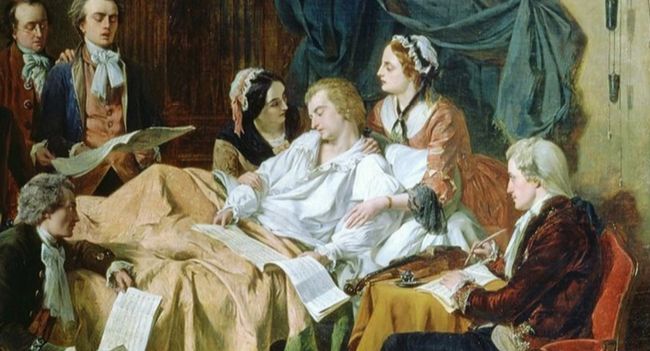That same year, Mozart fell ill and died at the age of 35, to the shock of the music world. Leaving this world at a relatively young age, he left behind many questions about his death.
Music prodigy
Wolfgang Amadeus Mozart is a name synonymous with genius. He is still a famous figure in the field of classical music composition, as brilliant as ever, even though he passed away 231 years ago. But what brought him to success and prominence in the music world?
Mozart was born into a musical family in the picturesque mountain town of Salzburg (Austria). His exposure to the world of music was certainly influenced by his father, Leopold Mozart, a composer, violinist and music teacher. His mother lost five children immediately after birth, and he was one of two lucky survivors.
Mozart was composing complex arrangements at the age of six, much to the delight of his musician father. Mr. Leopold went on a trip to Europe with Wolfgang and was extremely proud of his 8-year-old son’s talent. They spent three years performing before music-loving audiences, including aristocrats and royalty, who were amazed by the young genius.
At the age of 14, Mozart toured Rome, visited the Sistine Chapel and heard Allegri’s famous work Miserere mei Deus (May God Have Mercy). Captivated by this 12-minute masterpiece, Mozart returned home and that night rewrote the entire work from memory.
Hypotheses
 |
| Musical genius Wolfgang Amadeus Mozart (1756 – 1791). |
When Mozart died at the age of 35 on December 5, 1791, the world was extremely shocked by the sudden passing of a shining talent.
Regarding his death, many theories have been proposed:
Due to illness: According to some people who knew him, Mozart was overworked and fell ill a few weeks before his death. During the last two weeks of the composer’s life, Sophie Haibel, his sister-in-law, said that during the last two weeks of the composer’s life, he suffered from acute edema, high fever and blistered skin, making his entire body extremely uncomfortable when touched. .
She also recalled that a few weeks before his death, Mozart invited guests to practice new music with him. At this time, his health was weakening, so receiving many guests made his illness worse.
Many people believe that checking the doctor’s records about Mozart’s death status will provide the correct answer. However, as in most European countries in the 18th century, the diagnosis of death was often not recorded by a doctor on the death certificate in Vienna.
Thomas Franz Closet, Mozart’s personal physician, was asked about the musician’s young death, and gave details that coincided with Haibel’s account, according to which the patient had a high fever and blistered skin, seemingly related to to Hitziges Frieselfieber syndrome (Acute millet fever).
Murdered: A week after Mozart died, a Berlin newspaper reported that he was poisoned by composer Antonio Salieri, who was the conductor of the Austrian Royal Orchestra.
There is always an opposition between this person and Mozart. The theory that Salieri poisoned Mozart was supported by Peter Shaffer’s 1979 stage play Amadeus, and later by the 1984 Hollywood film adaptation of the play. Furthermore, some say that Salieri finally confessed to the murder on his deathbed in 1825.
One of the most illogical and scandalous theories is that Mozart was killed by his brother Franz Hofdemel in a fit of jealousy. According to rumors, Mozart had an affair with Magdalena, Hofdemel’s wife. When he discovered the incident, Hofdemel murdered Mozart and tried to kill Magdalena but failed.
Supporters of this theory have taken evidence from Mozart’s preserved skull in Salzburg, Austria. Accordingly, the healed fracture in his skull was caused by a blow with a stick.
However, anyone who looks at this objectively will realize that, if this was the cause of death, the fracture would not have had time to heal. However, there are many people who believe in this, including famous composer Ludwig Van Beethoven. He once refused to perform in front of Magdalena because he blamed her for Mozart’s death.
Due to a viral epidemic: A study conducted in 2009 by scientists and published in The Annals of Internal Medicine pointed to a most likely cause of death for genius musician.
They discovered the true cause of Mozart’s fatal illness by studying common deaths in Vienna at that time.
The results showed that up to 5,011 adults died from symptoms similar to Mozart between December 1791 and January 1792. It should also be noted that, in the weeks before Mozart’s death, the death toll in Vienna skyrocketed.
Recording family members’ accounts from death notices, scientists concluded that a virus epidemic spread throughout Vienna in 1792. This deadly virus was identified as streptococcus (Streptococcus). ), if left untreated, will lead to nephrotic syndrome. Modern medicine no longer considers this a scary disease.
However, if an autopsy is not performed using modern techniques, the cause of death of this musical genius will remain a mystery.

